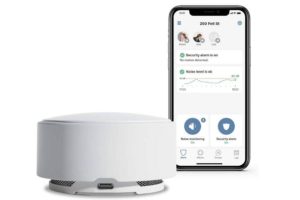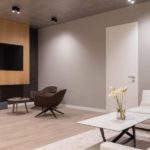Quick Navigation
- What is a Noise Detector?
- The Importance of Noise Management in Airbnb Rentals
- How Do Noise Detectors Work?
- Benefits of Using Noise Detectors in Airbnb Rentals
- Disadvantages of Using Noise Detectors in Airbnb Rentals
- Implementing Noise Detectors in Airbnb Rentals
- Best Practices for Using Noise Detectors in Airbnb Rentals
- Conclusion
Staying in an Airbnb rental can be a wonderful experience, but one potential challenge is managing noise levels.

Excessive noise can disrupt guests’ comfort and satisfaction, leading to negative reviews and potential conflicts.
However, hosts can proactively address this issue by utilizing noise detectors in their Airbnb rentals.
This article will discuss the benefits of using noise detectors, how they work, and essential considerations for hosts to ensure a peaceful environment for their guests.
What is a Noise Detector?
Noise detectors, known as sound level meters, measure and monitor sound intensity in decibels (dB). It consists of a microphone to capture sound, a processor to analyze the data, and a display to indicate noise levels.
The Importance of Noise Management in Airbnb Rentals
Maintaining a peaceful environment is crucial for guest satisfaction. Noise management is essential in ensuring a positive and comfortable experience for guests staying in Airbnb rentals.
Excessive noise can disrupt sleep, hinder relaxation, and lead to guest dissatisfaction. By prioritizing noise management, hosts can create a healthy environment and effectively manage noise.
How Do Noise Detectors Work?
Noise detectors can provide real-time feedback on different noise levels at the same time. They can trigger alerts when noise exceeds the specific limits.
One of the primary features of a noise detector is to measure the level of the sounds.
The decibels (dB) are units to identify the sound’s loudness. This detector then sends an alert or response by turning the warning light on or sending a notification.
Benefits of Using Noise Detectors in Airbnb Rentals
Effective noise management contributes to positive guest-host relationships and enhances the overall guest experience.
Hosts can differentiate their rentals and attract more satisfied guests by creating a peaceful environment, leading to increased bookings and success in the Airbnb marketplace.
The following are the advantages of having a noise detector in Airbnb rentals:
Securing Compliance with House Rules
Noise detectors help enforce house rules, such as quiet hours, by providing objective data on noise levels. It ensures that guests are aware of and adhere to the established guidelines.
Preventing Noise Disturbances
Real-time monitoring allows hosts to identify noise disturbances promptly.
With instant alerts, hosts can address noise issues immediately, minimizing disruptions for both the guest causing the disturbance and other occupants.
Improving Guest Satisfaction
Hosts implementing noise detectors create a peaceful environment that promotes relaxation and comfort.
This proactive approach enhances guest satisfaction, leading to more positive ratings and increased bookings.
Eliminating Noise-Related Complaints
Noise detectors provide objective evidence in case of noise-related complaints.
Hosts can refer to the recorded data to address disputes effectively, protecting their reputation and mitigating potential conflicts.
Disadvantages of Using Noise Detectors in Airbnb Rentals
While noise detectors can be beneficial in managing noise levels in Airbnb rentals, there are also some potential disadvantages to consider.
Hosts need to be aware of these drawbacks to make an informed decision about implementing noise detectors. Here are some disadvantages of using noise detectors in Airbnb:
Invasion of Privacy
One of the primary concerns with noise detectors is the potential invasion of guests’ privacy.
Guests may feel uncomfortable knowing that their conversations or activities are being monitored, even if they are solely for noise management.
It can lead to a perception that their privacy is compromised, which may discourage customers.

False Positives
Noise detectors may occasionally generate false positive alerts, indicating excessive noise when there may not be a disturbance.
It can cause unnecessary interruptions and inconvenience for both guests and hosts.
False positives can be triggered by various factors, such as loud external noises or even regular conversations that are misinterpreted as excessive noise.
Technical Limitations
Noise detectors may have technical limitations that can affect their accuracy and effectiveness.
Factors like distance from the noise source, background noise levels, and device calibration can impact the reliability of the measurements.
Hosts should ensure that their chosen noise detector is of good quality and properly maintained.
Dependency on Technology
Relying solely on noise detectors to manage noise levels may create a sense of dependency on technology.
It can lead to a lack of personal interaction and communication between hosts and guests in addressing noise issues.
Hosts need to maintain open lines of communication and be proactive in resolving noise disturbances rather than solely relying on technology.
Potential for Misuse or Misinterpretation
In some cases, noise detectors may be misused or misinterpreted.
Hosts may wrongfully accuse guests of noise violations based solely on the readings from the device without considering other factors or verifying the accuracy of the measurements.
It can create conflicts and misunderstandings between hosts and guests.
Limited Effectiveness in Certain Situations
Noise detectors may only sometimes be effective in managing certain types of noise, such as low-frequency vibrations or structural sounds.
These types of noise may need to be accurately captured by standard noise detectors, limiting their effectiveness in addressing all noise concerns.
Implementing Noise Detectors in Airbnb Rentals
Before implementing noise detectors, hosts must weigh them against the potential benefits and consider the disadvantages.
The following are the basic ways of implementing noise detectors in Airbnb rentals:
Choose the Right Noise Detector
Consider factors such as sensitivity, ease of use, and compatibility with smart home systems when selecting a noise detector.
Find a device that suits the specific needs and layout of the rental property.
Inform Guests about the Noise Detector
Transparent communication is essential. Include information about the noise detector in the listing description, house rules, or rental agreement.
Clearly explain its purpose and how it contributes to a peaceful stay.
Respect Guest Privacy

Respect guest privacy by ensuring the noise detector does not infringe upon their rights.
Communicate how the device captures sound only for noise monitoring purposes and assure guests that their privacy is valued.
Best Practices for Using Noise Detectors in Airbnb Rentals
Implementing noise detectors also provides basic practices to make them worthy of long-term use. The following are the essential things to consider:
Set Appropriate Noise Thresholds
Consider local regulations and guidelines to determine reasonable noise thresholds for different times of the day.
Communicate these thresholds to guests to establish clear expectations.
Address Noise Violations
Promptly address noise violations by contacting the guest responsible for the disturbance.
Remind them of the noise policies and potential consequences for non-compliance, such as fines or eviction.
Regular Maintenance and Calibration
Ensure the noise detector is appropriately maintained and calibrated to provide accurate measurements. Regularly check the device to ensure it is functioning correctly.
In turn, it can minimize malfunctioning. If you’re using an app, regularly check if it is updated.
Conclusion
Using noise detectors in Airbnb rentals, hosts can proactively manage noise levels and create a peaceful environment for guests.
This approach enhances guest satisfaction, protects hosts from noise-related issues, and fosters positive reviews.
Open communication, transparent policies, and a balance between technology and personal interaction are essential to building a positive guest experience.
By following best practices and respecting guest privacy, hosts can ensure an enjoyable stay for all.
Remember to review local regulations and consult legal professionals to ensure proper adherence to applicable laws regarding using noise detectors in rental accommodations.






